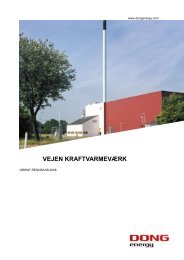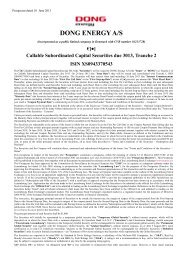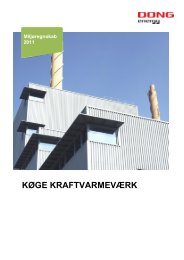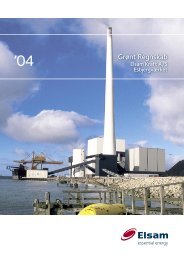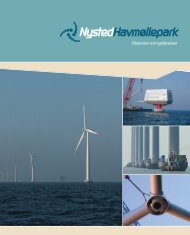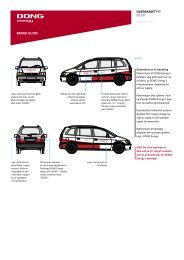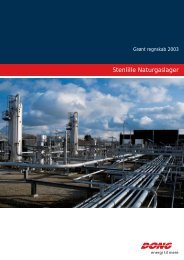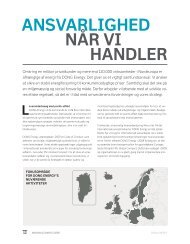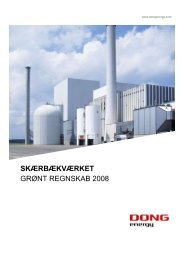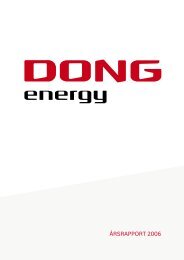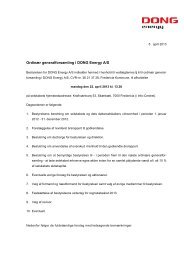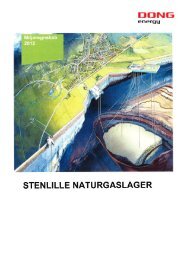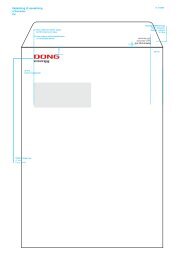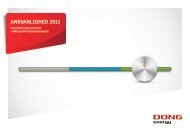ANNUAL REPORT 2011 - DONG Energy
ANNUAL REPORT 2011 - DONG Energy
ANNUAL REPORT 2011 - DONG Energy
Create successful ePaper yourself
Turn your PDF publications into a flip-book with our unique Google optimized e-Paper software.
Environment<br />
As an energy company, <strong>DONG</strong> <strong>Energy</strong> leaves a significant<br />
mark on the environment. The Group therefore has an obligation<br />
to society to work in a long-term, systematic manner<br />
to limit these impacts. Consideration for the climate and the<br />
environment is being continuously integrated as a natural<br />
part of the Group’s activities and decision-making processes.<br />
<strong>DONG</strong> <strong>Energy</strong> has an overall environment policy in which<br />
the Group takes responsibility for minimising its environmental<br />
impact and aims to continually optimise its systems and<br />
processes. The policy is followed up by international certified<br />
management systems in the parts of the business where this<br />
creates value and which entail the highest risks. The environmental<br />
management standard ISO 14001 is applied at all<br />
Danish facilities that generate electricity and heat, in electric-<br />
Staff and organisational risks<br />
Employee safety<br />
For <strong>DONG</strong> <strong>Energy</strong>, a stimulating, healthy working environment<br />
coupled with a high level of safety in the workplace is a<br />
prerequisite for operating a responsible and efficient company.<br />
Safety is therefore factored into all the Group’s activities.<br />
Safety awareness is high, and the Group continuously<br />
strives to improve its safety performance through prevention,<br />
training, education and involvement of employees to cement<br />
the culture: “The safe way – or no way”. These initiatives have<br />
resulted in a markedly falling injury frequency in recent years.<br />
Despite this positive development and the lowest injury<br />
frequency in the history of the Group, <strong>DONG</strong> <strong>Energy</strong> did not<br />
meet its ambition of zero fatalities in <strong>2011</strong>. There were two<br />
accidents at the Group’s subcontractors that led to three fatalities.<br />
<strong>DONG</strong> <strong>Energy</strong> takes these extremely seriously.<br />
The Group has therefore increased its focus on the overall<br />
safety plan, including safety at subcontractors, and associated<br />
systems. The new measures include heightened awareness<br />
of the safety culture, with safety being made a clear<br />
managerial priority across <strong>DONG</strong> <strong>Energy</strong>. The programme<br />
also comprises development of an e-learning programme<br />
• Group Risk Control is responsible for controlling that<br />
<strong>DONG</strong> <strong>Energy</strong>’s financial risks, associated operational<br />
risks, IT risks and strategic risks are identified, measured<br />
and accounted for in accordance with the Group’s guidelines.<br />
Group Risk Control reports to the Chairman of the<br />
Board of Directors’ Audit and Risk Committee.<br />
<strong>DONG</strong> <strong>Energy</strong> also has a central risk management function<br />
that continuously monitors the Group’s overall financial<br />
and energy-related risks and ensures the Group applies appropriate<br />
limits for its risk management. The risk management<br />
function reports regularly to <strong>DONG</strong> <strong>Energy</strong>’s Finance<br />
Committee, and the Board of Directors’ Audit and Risk<br />
Committee receives a quarterly report on the risks identified<br />
as well as reporting on compliance with guidelines.<br />
ity distribution and in oil and gas activities in the North Sea.<br />
Identification and reduction of potential environmental risks<br />
and social risks is a statutory requirement on large projects,<br />
for example offshore wind farms, power stations and exploration<br />
and production activities. Such EIAs (Environmental<br />
Impact Assessments) help achieve the objective of having a<br />
low environmental impact in all phases – from project planning,<br />
through construction and consumption to disposal<br />
and decommissioning.<br />
<strong>DONG</strong> <strong>Energy</strong> works systematically to record, manage<br />
and follow up on environmental incidents. The Group applies<br />
the principle that the severity of an incident should determine<br />
the level of management, and has implemented a<br />
system for risk assessment and systematic follow-up in connection<br />
with incidents.<br />
that all the Group’s employees and suppliers must complete<br />
in 2012. This ensures that <strong>DONG</strong> <strong>Energy</strong>’s core values and<br />
safety requirements reach both all the Group’s own employees<br />
and all supplier employees.<br />
attracting and retaining competent employees<br />
<strong>DONG</strong> <strong>Energy</strong> competes internationally for the resources<br />
and skills that are to secure its future growth. This applies<br />
especially to the commercial and technical skills in Exploration<br />
& Production and Wind Power and commercial skills<br />
in <strong>Energy</strong> Markets.<br />
As <strong>DONG</strong> <strong>Energy</strong> is still very ’Danish’ in many respects,<br />
difficulties may arise in connection with both recruitment<br />
and retention of international employees.<br />
In a worst case scenario, an inadequate supply of<br />
skilled labour could result in <strong>DONG</strong> <strong>Energy</strong> not being able<br />
to implement its planned strategy. To reduce this risk, the<br />
Group has focused in recent years on a variety of activities,<br />
including employer branding, identification of key skills,<br />
talent/skills development and improvement of the conditions<br />
for attracting skilled foreign labour.<br />
Market and credit risks are managed under powers approved<br />
by the Board of Directors which the Executive<br />
Board has delegated via an overall risk policy for <strong>DONG</strong><br />
<strong>Energy</strong> and the individual business areas.<br />
<strong>DONG</strong> <strong>Energy</strong> also has an independent central function<br />
that checks all investment proposals before they are submitted<br />
to the management. The function also ensures optimum<br />
focus on value creation in the execution of approved<br />
investments.<br />
Lastly, <strong>DONG</strong> <strong>Energy</strong> is committed to ensuring that the<br />
company is a safe workplace and limiting any impacts on<br />
the climate and the environment. These efforts are coordinated<br />
by the corporate function QHSE (quality, health,<br />
safety, environment).<br />
<strong>DONG</strong> ENERGY <strong>DONG</strong> ENERGY GROUP <strong>ANNUAL</strong> <strong>REPORT</strong> <strong>2011</strong> – manaGEmEnt’s rEviEw 51



